Favorite Animated Film
 Being a dad, it seems like I watch more animated movies than any other type. And since I am a film snob, I can’t stand to endlessly re-watch sub-par movies the way that I see so many parents do. Just because Cars is my kids’ favorite Pixar movie, that doesn’t mean that I am going to put it on every time they ask to watch a movie. Although they would be happy with that, I would go insane. And even if it was a good movie, it would lose some of its magic after seeing it twice a week for 3 years. I am constantly looking for good animated films to share with my family. That passion, along with my general love for film, led me to the breathtaking and impressive canon of Japanese hand-drawn animation director Hayao Miyazaki.
Being a dad, it seems like I watch more animated movies than any other type. And since I am a film snob, I can’t stand to endlessly re-watch sub-par movies the way that I see so many parents do. Just because Cars is my kids’ favorite Pixar movie, that doesn’t mean that I am going to put it on every time they ask to watch a movie. Although they would be happy with that, I would go insane. And even if it was a good movie, it would lose some of its magic after seeing it twice a week for 3 years. I am constantly looking for good animated films to share with my family. That passion, along with my general love for film, led me to the breathtaking and impressive canon of Japanese hand-drawn animation director Hayao Miyazaki.
Now 70 years old, he is often referred to as the Japanese Walt Disney. He has directed ten feature length animated films as well as several shorts and Japanese television shows and personally hand drawn tens of thousands of frames. I know that most Americans don’t think to highly of “Japanimation,” as it has been called. I can’t say that I blame them. Run of the mill “Japanimation” is irritating, overly violent, raunchy, indulgent, and devoid of good storytelling. But that description could be used to describe most modern American fare.
 But Miyazaki is a glowing exception. His animation has an attention to detail that rivals the exacting standards of a company like Pixar. His intense yet delicate shading of colors would make his works of art more at home in a fine art gallery than in the Sunday comics. Miyazaki also has a great sense of humor, a gift for poetic storytelling, and a taste for adventure. His beautiful children’s movie, My Neighbor Totoro, is a charming and deeply affecting look at how a child’s imagination helps her endure a time of private fear and sadness. His most recent work, Ponyo, is a beautiful story of the transforming power of love. Princess Mononoke, is a powerful, sprawling epic about the need for humankind to respect and live in harmony with the environment. And that is a message that people of all faiths should proclaim.
But Miyazaki is a glowing exception. His animation has an attention to detail that rivals the exacting standards of a company like Pixar. His intense yet delicate shading of colors would make his works of art more at home in a fine art gallery than in the Sunday comics. Miyazaki also has a great sense of humor, a gift for poetic storytelling, and a taste for adventure. His beautiful children’s movie, My Neighbor Totoro, is a charming and deeply affecting look at how a child’s imagination helps her endure a time of private fear and sadness. His most recent work, Ponyo, is a beautiful story of the transforming power of love. Princess Mononoke, is a powerful, sprawling epic about the need for humankind to respect and live in harmony with the environment. And that is a message that people of all faiths should proclaim.
I almost chose Princess Mononoke, but decided to go with what is widely considered to be Miyazaki’s masterpiece. Spirited Away combines the weighty mythologizing of Mononoke with the playful spirit of My Neighbor Totoro, but then goes in new directions as well. It is funny to me that Walt Disney Studios has helped bring Miyazaki’s features to American cinemas, because Miyazaki’s work tends to reveal that most Disney films are simplistic and predictable.
 Spirited Away is a coming of age story of a little girl named Chihiro, who gets lost in a wonderland of spirits and witches, and her quest to find a way to break the curse that has transformed her parents so they can return home. Her only friend in this world is a mysterious boy named Haku who helps her to survive. Eventually we come to hope that Chihiro, her parents, and Haku will all eventually break away from the harsh tyranny of the powerful and dictatorial witch Yubaba.
Spirited Away is a coming of age story of a little girl named Chihiro, who gets lost in a wonderland of spirits and witches, and her quest to find a way to break the curse that has transformed her parents so they can return home. Her only friend in this world is a mysterious boy named Haku who helps her to survive. Eventually we come to hope that Chihiro, her parents, and Haku will all eventually break away from the harsh tyranny of the powerful and dictatorial witch Yubaba.
The secret to their freedom lies in discovering their true identities. Yubaba gains her power and control over her subjects by stealing their identities, much like Ursula in The Little Mermaid. Yubaba can hold her own with the most memorable wicked witches of all time. She’s wider than she is tall, her head makes up half her body, she has snake-like shoots of white hair bound up in a bun, and her massive nose bulges out before her like a weapon. She snarls and cackles her way through the film. 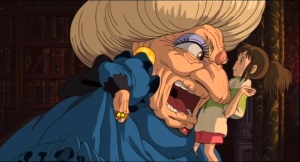 One of the things I love about Miyazaki is that he never sets up a simplistic face-off between good and evil. He knows we all have good and evil within us, and thus his “villains” have moments of kindness, and his heroes do things they regret.
One of the things I love about Miyazaki is that he never sets up a simplistic face-off between good and evil. He knows we all have good and evil within us, and thus his “villains” have moments of kindness, and his heroes do things they regret.
If the film sounds complicated, it’s because it is. This film runs just over two hours, but with its fast pace and a plethora of subplots Spirited Away feels like Miyazaki decided to challenge George Lucas at his own game of exotic adventure and whimsy. There are enough bizarre creatures here to make the cantina in Star Wars look boring. The depth and fertility of Miyazaki’s imagination leaves me stunned at every turn.
 Some will say that this film is too complex for children, and too scary. For small children, possibly. They could get lost in the intricate plot, and the monsters might scare them. I personally showed it to my kids starting at age 5 and up. But I think kids should be challenged to think through what they’re watching, and this is a story that provides great opportunities for discussion with grownups. Spirited Away is at times frightening, but it emphasizes the importance of an individual’s virtue, and affirms that the smallest of characters can make a big difference. It offers powerful displays of sacrificial love. And it, as I mentioned before, portrays “villains” who are redeemable and can be transformed by compassion and kindness.
Some will say that this film is too complex for children, and too scary. For small children, possibly. They could get lost in the intricate plot, and the monsters might scare them. I personally showed it to my kids starting at age 5 and up. But I think kids should be challenged to think through what they’re watching, and this is a story that provides great opportunities for discussion with grownups. Spirited Away is at times frightening, but it emphasizes the importance of an individual’s virtue, and affirms that the smallest of characters can make a big difference. It offers powerful displays of sacrificial love. And it, as I mentioned before, portrays “villains” who are redeemable and can be transformed by compassion and kindness.
Many Christians will probably berate me for my love of this film calling it occultic. But Miyazaki comes from a culture that is steeped in Shinto mythology and beliefs about the spirits of nature and of the dead. So of course, his story reflects such traditions and beliefs. But he is not “preaching” these ideas any more than Jiminy Cricket is preaching astrology when he croons about wishing upon a star. He is treating them as myth, as fantasy, and using them to illustrate lessons and morals that open-minded Christians will find quite similar to their own. The film makes no mention of “God” or any benevolent force which rules the world, but it does affirm the importance of personal virtues like: selflessness, sacrificial love, humility, friendship, compassion, and courage. People of any faith can read these characters as symbolic, and the story reflects powerful truths.
 One spirit in particular, No Face, appears at first to be gentle and friendly. But he becomes more and more mysterious, shifting between gentleness and violent destructive behavior. Eventually, we come to understand that he is a lonely spirit who seeks approval. When he is around greed and evil, he responds with greed and evil. But when he is offered friendship and unconditional love, he seems to try a better path. Chihiro has patience with him and her kindness reminds me of how Christ patiently endures with me in my own tendency to become self-absorbed. He waits patiently, always offering love, forgiveness, and direction to a better way. No Face is amazed at Chihiro’s virtue. And I came to hope that he would abandon his violence and follow Chihiro to a better life. This is just one of many such parables within a vast tapestry of interconnected stories.
One spirit in particular, No Face, appears at first to be gentle and friendly. But he becomes more and more mysterious, shifting between gentleness and violent destructive behavior. Eventually, we come to understand that he is a lonely spirit who seeks approval. When he is around greed and evil, he responds with greed and evil. But when he is offered friendship and unconditional love, he seems to try a better path. Chihiro has patience with him and her kindness reminds me of how Christ patiently endures with me in my own tendency to become self-absorbed. He waits patiently, always offering love, forgiveness, and direction to a better way. No Face is amazed at Chihiro’s virtue. And I came to hope that he would abandon his violence and follow Chihiro to a better life. This is just one of many such parables within a vast tapestry of interconnected stories.
All in all, this is an absolute must-see. And the bigger the screen the better. The colors are incredible, from shots of a magical train that skims across the sea, to fantastical gardens and intricately painted murals. Well, I’ve said my piece. What is your favorite Animated movie? Do you love Miyazaki’s work as much as I do, or do you have another opinion. I’d love to hear your thoughts in the comments below or on Twitter or Facebook.
 As I have read and heard so many people speaking fondly of him, I felt compelled to share my first memory of David Bowie. It was in the 1986 film Labyrinth, I was too young to remember seeing it when it first was released, but I recall renting the film from our local video store and watching raptly as a Sarah (Jennifer Connelly) struggled on a magical adventure to rescue her brother from Bowie’s deceptions as the goblin king Jareth.
As I have read and heard so many people speaking fondly of him, I felt compelled to share my first memory of David Bowie. It was in the 1986 film Labyrinth, I was too young to remember seeing it when it first was released, but I recall renting the film from our local video store and watching raptly as a Sarah (Jennifer Connelly) struggled on a magical adventure to rescue her brother from Bowie’s deceptions as the goblin king Jareth.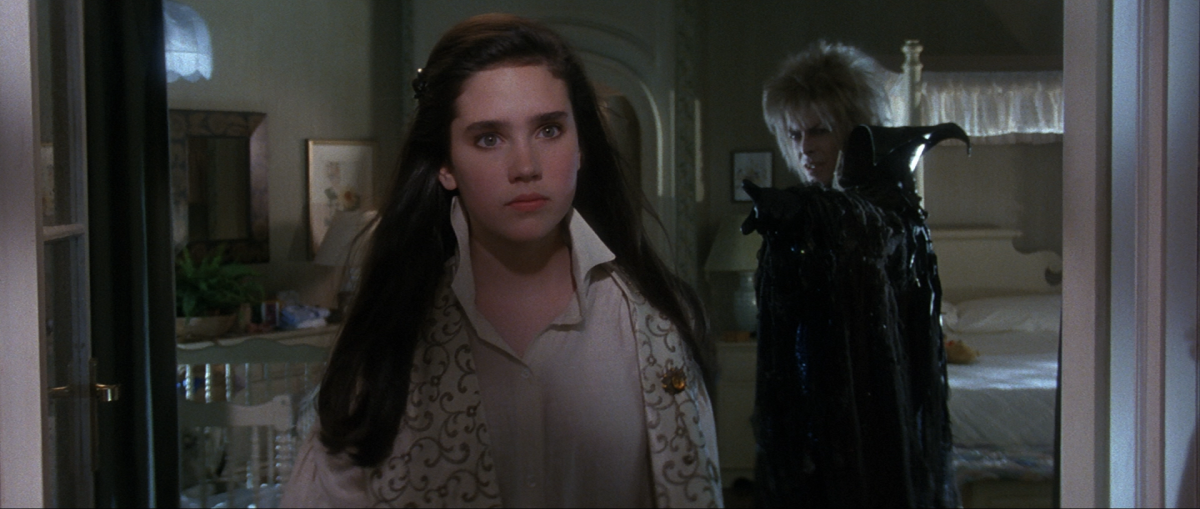
 Being a dad, it seems like I watch more animated movies than any other type. And since I am a film snob, I can’t stand to endlessly re-watch sub-par movies the way that I see so many parents do. Just because Cars is my kids’ favorite Pixar movie, that doesn’t mean that I am going to put it on every time they ask to watch a movie. Although they would be happy with that, I would go insane. And even if it was a good movie, it would lose some of its magic after seeing it twice a week for 3 years. I am constantly looking for good animated films to share with my family. That passion, along with my general love for film, led me to the breathtaking and impressive canon of Japanese hand-drawn animation director
Being a dad, it seems like I watch more animated movies than any other type. And since I am a film snob, I can’t stand to endlessly re-watch sub-par movies the way that I see so many parents do. Just because Cars is my kids’ favorite Pixar movie, that doesn’t mean that I am going to put it on every time they ask to watch a movie. Although they would be happy with that, I would go insane. And even if it was a good movie, it would lose some of its magic after seeing it twice a week for 3 years. I am constantly looking for good animated films to share with my family. That passion, along with my general love for film, led me to the breathtaking and impressive canon of Japanese hand-drawn animation director  But Miyazaki is a glowing exception. His animation has an attention to detail that rivals the exacting standards of a company like Pixar. His intense yet delicate shading of colors would make his works of art more at home in a fine art gallery than in the Sunday comics. Miyazaki also has a great sense of humor, a gift for poetic storytelling, and a taste for adventure. His beautiful children’s movie, My Neighbor Totoro, is a charming and deeply affecting look at how a child’s imagination helps her endure a time of private fear and sadness. His most recent work, Ponyo, is a beautiful story of the transforming power of love. Princess Mononoke, is a powerful, sprawling epic about the need for humankind to respect and live in harmony with the environment. And that is a message that people of all faiths should proclaim.
But Miyazaki is a glowing exception. His animation has an attention to detail that rivals the exacting standards of a company like Pixar. His intense yet delicate shading of colors would make his works of art more at home in a fine art gallery than in the Sunday comics. Miyazaki also has a great sense of humor, a gift for poetic storytelling, and a taste for adventure. His beautiful children’s movie, My Neighbor Totoro, is a charming and deeply affecting look at how a child’s imagination helps her endure a time of private fear and sadness. His most recent work, Ponyo, is a beautiful story of the transforming power of love. Princess Mononoke, is a powerful, sprawling epic about the need for humankind to respect and live in harmony with the environment. And that is a message that people of all faiths should proclaim. Spirited Away is a coming of age story of a little girl named Chihiro, who gets lost in a wonderland of spirits and witches, and her quest to find a way to break the curse that has transformed her parents so they can return home. Her only friend in this world is a mysterious boy named Haku who helps her to survive. Eventually we come to hope that Chihiro, her parents, and Haku will all eventually break away from the harsh tyranny of the powerful and dictatorial witch Yubaba.
Spirited Away is a coming of age story of a little girl named Chihiro, who gets lost in a wonderland of spirits and witches, and her quest to find a way to break the curse that has transformed her parents so they can return home. Her only friend in this world is a mysterious boy named Haku who helps her to survive. Eventually we come to hope that Chihiro, her parents, and Haku will all eventually break away from the harsh tyranny of the powerful and dictatorial witch Yubaba. One of the things I love about Miyazaki is that he never sets up a simplistic face-off between good and evil. He knows we all have good and evil within us, and thus his “villains” have moments of kindness, and his heroes do things they regret.
One of the things I love about Miyazaki is that he never sets up a simplistic face-off between good and evil. He knows we all have good and evil within us, and thus his “villains” have moments of kindness, and his heroes do things they regret. Some will say that this film is too complex for children, and too scary. For small children, possibly. They could get lost in the intricate plot, and the monsters might scare them. I personally showed it to my kids starting at age 5 and up. But I think kids should be challenged to think through what they’re watching, and this is a story that provides great opportunities for discussion with grownups. Spirited Away is at times frightening, but it emphasizes the importance of an individual’s virtue, and affirms that the smallest of characters can make a big difference. It offers powerful displays of sacrificial love. And it, as I mentioned before, portrays “villains” who are redeemable and can be transformed by compassion and kindness.
Some will say that this film is too complex for children, and too scary. For small children, possibly. They could get lost in the intricate plot, and the monsters might scare them. I personally showed it to my kids starting at age 5 and up. But I think kids should be challenged to think through what they’re watching, and this is a story that provides great opportunities for discussion with grownups. Spirited Away is at times frightening, but it emphasizes the importance of an individual’s virtue, and affirms that the smallest of characters can make a big difference. It offers powerful displays of sacrificial love. And it, as I mentioned before, portrays “villains” who are redeemable and can be transformed by compassion and kindness. One spirit in particular, No Face, appears at first to be gentle and friendly. But he becomes more and more mysterious, shifting between gentleness and violent destructive behavior. Eventually, we come to understand that he is a lonely spirit who seeks approval. When he is around greed and evil, he responds with greed and evil. But when he is offered friendship and unconditional love, he seems to try a better path. Chihiro has patience with him and her kindness reminds me of how Christ patiently endures with me in my own tendency to become self-absorbed. He waits patiently, always offering love, forgiveness, and direction to a better way. No Face is amazed at Chihiro’s virtue. And I came to hope that he would abandon his violence and follow Chihiro to a better life. This is just one of many such parables within a vast tapestry of interconnected stories.
One spirit in particular, No Face, appears at first to be gentle and friendly. But he becomes more and more mysterious, shifting between gentleness and violent destructive behavior. Eventually, we come to understand that he is a lonely spirit who seeks approval. When he is around greed and evil, he responds with greed and evil. But when he is offered friendship and unconditional love, he seems to try a better path. Chihiro has patience with him and her kindness reminds me of how Christ patiently endures with me in my own tendency to become self-absorbed. He waits patiently, always offering love, forgiveness, and direction to a better way. No Face is amazed at Chihiro’s virtue. And I came to hope that he would abandon his violence and follow Chihiro to a better life. This is just one of many such parables within a vast tapestry of interconnected stories.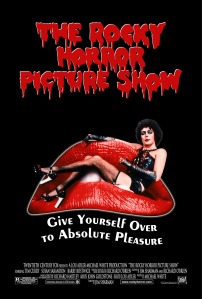 I was interested in this topic from the first time I read the challenge because of the way it is worded. It is asking for a movie that no one would expect you to love. This doesn’t imply that you actually do love that movie. It forces you to put yourself in the shoes of those that know you. You have to inspect your own preferences. If the challenge was asking for a film that you actually liked, then it would say, “A movie that people would be surprised to find that you loved.”
I was interested in this topic from the first time I read the challenge because of the way it is worded. It is asking for a movie that no one would expect you to love. This doesn’t imply that you actually do love that movie. It forces you to put yourself in the shoes of those that know you. You have to inspect your own preferences. If the challenge was asking for a film that you actually liked, then it would say, “A movie that people would be surprised to find that you loved.”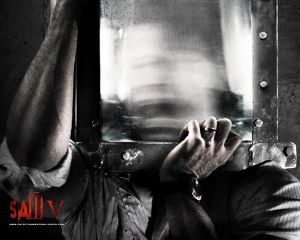 I think it is a lot of fun, and the musical numbers will be stuck in your head for days. Tim Curry as the transvestite from the planet of Transylvania is funny, creepy, and campy all at once. This is my favorite movie to watch on Halloween.
I think it is a lot of fun, and the musical numbers will be stuck in your head for days. Tim Curry as the transvestite from the planet of Transylvania is funny, creepy, and campy all at once. This is my favorite movie to watch on Halloween. Anyway, onto the movie. Have you ever had a dream that freaked you out and left you gasping for breath as you rushed back to consciousness? When your loved ones come in the room to check if you are okay all you can say is I had a bad dream. Invariably they will ask what it was about, but we can’t say because 1) the dream is quickly retreating into our sub conscience, and 2) because no matter how well you explain what happened in the dream you sound psychotic. Mulholland Dr. is that creepy dream.
Anyway, onto the movie. Have you ever had a dream that freaked you out and left you gasping for breath as you rushed back to consciousness? When your loved ones come in the room to check if you are okay all you can say is I had a bad dream. Invariably they will ask what it was about, but we can’t say because 1) the dream is quickly retreating into our sub conscience, and 2) because no matter how well you explain what happened in the dream you sound psychotic. Mulholland Dr. is that creepy dream. To truly enjoy it, you must surrender yourself to it. As Roger Ebert said, “If you require logic, see something else.”
To truly enjoy it, you must surrender yourself to it. As Roger Ebert said, “If you require logic, see something else.”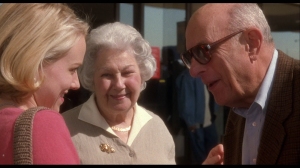 Also, this film features what I think should have been at the very least and Oscar Nominated performance by Naomi Watts. It would have been more deserved than Halle Berry for Monster’s Ball, and far more that Renée Zellweger for Bridget Jones’ DiaryNaomi Watts is engaging on both sides of the coin of her character. On one hand she is Betty, the perky and naïve, but very talented newcomer to Hollywood. On the other, she is Diane, the frustrated and depressed reality of the too-good-to-be-true Betty. She pulls this off so well that I didn’t realize that it was the same actress playing both parts until well into watching the film the first time. I’m still waiting for Ms. Watts to reach the climax of her career, she has made a number of good films, but nothing to set her apart from every other fair-skinned, blue-eyed, blonde in Hollywood.
Also, this film features what I think should have been at the very least and Oscar Nominated performance by Naomi Watts. It would have been more deserved than Halle Berry for Monster’s Ball, and far more that Renée Zellweger for Bridget Jones’ DiaryNaomi Watts is engaging on both sides of the coin of her character. On one hand she is Betty, the perky and naïve, but very talented newcomer to Hollywood. On the other, she is Diane, the frustrated and depressed reality of the too-good-to-be-true Betty. She pulls this off so well that I didn’t realize that it was the same actress playing both parts until well into watching the film the first time. I’m still waiting for Ms. Watts to reach the climax of her career, she has made a number of good films, but nothing to set her apart from every other fair-skinned, blue-eyed, blonde in Hollywood. Do yourself a favor, check out Mulholland Dr. set aside all the distractions and just let it wash over you. Then come back and give me all your theories about what is really going on. There are literally dozens of different theories. If you’ve already seen the movie, you can check them out at
Do yourself a favor, check out Mulholland Dr. set aside all the distractions and just let it wash over you. Then come back and give me all your theories about what is really going on. There are literally dozens of different theories. If you’ve already seen the movie, you can check them out at